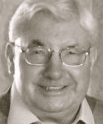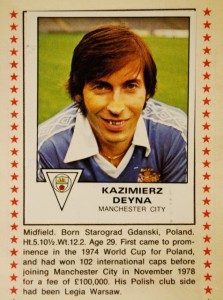- 9
*
JOHN ROBERTS wrote for the Daily Express, The Guardian, the Daily Mail and The Independent, where he was the tennis correspondent for 20 years. He collaborated with Bill Shankly on the Liverpool manager’s autobiography, ghosted Kevin Keegan’s first book, and has written books on George Best, Manchester United’s Busby Babes (The Team That Wouldn’t Die) and Everton (The Official Centenary History). As Matthew Engel once wrote in the British Journalism Review: “I suspect posh-paper sports writing changed forever the day John Roberts left the Daily Express to join The Guardian in the late 1970s, was handed a piece of routine agency copy and picked up a telephone to start asking questions.”
.
Not in our wildest dreams did we ever imagine that one day Manchester City would be close enough to the oil and gas wealth in the Middle East that they’d become the world’s richest football club, though in fairness Peter Swales did once tell me that his office was across the road from Mecca.
The late City chairman, who oversaw some of the club’s most profligate spending in the transfer market during Malcolm Allison’s second coming in the late 1970s, was referring to Mecca Bingo, in Sale.
Some of the club’s fans are old enough to remember when players dropped out of the sky. Well, one at least – the amazing goalkeeper Bert Trautmann, a German paratrooper who became a prisoner of war in St Helens.
When Allison’s spending spree led to mounting bills, a joke did the rounds suggesting that City still owed the Third Reich for Bert.
City’s transfer dealings then were chicken feed compared with the current fantasy league outlay made possible by Sheikh Mansour’s investment. But one deal in particular, shortly before Allison’s return, appeared to be a bargain even by City’s standards. That was the signing of Kazimierz Deyna, the 30-year-old captain of Poland’s 1978 World Cup team.
This tale unfolded shortly after the tournament in Argentina, at a time when I was working for The Guardian in Manchester. Asked to check an agency story that Sheffield United were hoping to sign the Argentine World Cup pair, Osvaldo Ardiles and Ricardo Villa, I was told by United’s manager, Harry Haslam, who was a friend of the former Argentine international Antonio Rattin, that Manchester City were in the frame.
I discovered that Peter Swales was attending a show at a theatre in Altrincham, so I called the booking office, where Peter came to take my call. He told me City were not going to sign Ardiles and Villa (who later went to Spurs) and invited me to meet him at the Bowdon Hotel a few days later.
He told me that City were looking for a midfield player and had been unable to buy Ipswich Town’s Brian Talbot, who later moved to Arsenal. “Do you have any ideas who we could sign, John?” he asked.
I remembered that during the one of the World Cup games I’d seen on television, the BBC’s Barry Davies had made an off-the-cuff comment that Deyna would be interested in playing club football in Western Europe.
“How do we follow that up?” Swales asked me, and I told him I had the home telephone number of the Poland coach, Jacek Gmoch, whom I’d met when he’d visited Manchester United to study training methods.
So I contacted Gmoch, who confirmed Deyna’s interest, saying: “I know Deyna would like to move and Manchester City seems to me to be the kind of club which would suit him. In my opinion, Deyna has enough stamina and ability to be able to offer at least two seasons in highest grade of football anywhere in the world.”
Deyna, a lieutenant in the Polish army, played for the army club Legia Warsaw, for whom he had scored almost 200 goals in nearly 500 games, so City had to enter into a series of complex negotiations with the Polish FA, the Polish government and the Polish army. There was no problem with the translations, however, because City already had one Pole at the club: George Bergier was the head of match-day catering.
The Polish army had to agree to demobilise Deyna, and the Polish FA delayed transferring his registration forms until a train arrived bearing photocopying machines and medical instruments, which were part of the “transfer fee”. The deal cost City around £100,000, comprising machinery, tools and some cash in US dollars, which the Poles used to send their athletes abroad to prepare for the 1980 Moscow Olympics.
Deyna arrived at Maine Road in November 1978 and the City manager, Tony Book, immediately pitched him into the first team for a home match against Ipswich Town, the tempo of which was so hectic that the craftsman with 102 international caps to his credit imagined he had been thrust into a pin-ball machine.
After Allison returned to succeed Book, Deyna found himself playing mainly in the reserves, even though the new manager conceded that he had immense ability. “City play ping-pong football,” was Deyna’s response. “I don’t need Malcolm Allison to tell me I am a great player. Pele told me I’m a great player.”
Although Deyna outlasted Allison, who left Maine Road in 1980, the next manager, John Bond, also rejected his talents. After one of Deyna’s rare first team appearances, at Stoke City, the Stoke manager, Alan Durban summerised the situation thus: “The problem is, Deyna’s on a different wavelength. He’s tuned to Radio Four, and the others are on Radio Luxembourg.”
Deyna was sold to the San Diego Sockers in January 1981 and continued to play professionally until 1987, then became a coach in the United States until his tragically premature death in a car crash in California in 1989.
.
Take a look at the sportingintelligence home page
Other articles on this site with Manchester City content
.
To purchase a copy of the recently re-published Bill Shankly autobiography, ‘Shankly: My Story’ by Bill Shankly, with John Roberts, buy direct from the publisher with free UK delivery by clicking here.









9 comments
Wonderful story and wonderfully well written. What a find – hope there are plenty more where that came from!
Deyna was a wonderful player; stylishly understated, and that was captured so perfectly by Durban’s comment at the time.
I “stumbled” upon this when reading other City-related writings. What a joy to be taken back in time. Thank you John Roberts – you’ll have to forgive me that I wasn’t previously aware of your work to a great extent. I am now
Top story!
I had no idea we had foreign players that far back.
Me and my neighbour were just preparing to do some research about this. I am very happy to see such great information being shared freely out there.
The world cup is only 6 months away! Thanks for this. I’m a football fanatic
Link: Transfer fees of medical tools and a photocopier
Very informative text. I’ve found your blog by accident but I’m really happy that i did. You have some really good info on here:)
Thank You John!. Do You know anyone who has dvd – 1977 Man City- Widzew Lodz?.
regards
Sorry Rod, I don’t. Have you tried the Man City shop?